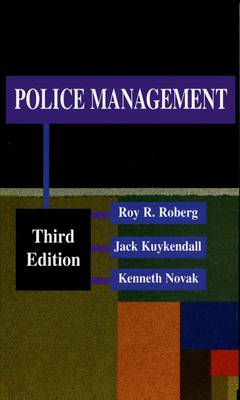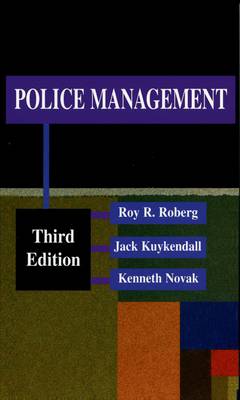
- Afhalen na 1 uur in een winkel met voorraad
- Gratis thuislevering in België vanaf € 30
- Ruim aanbod met 7 miljoen producten
- Afhalen na 1 uur in een winkel met voorraad
- Gratis thuislevering in België vanaf € 30
- Ruim aanbod met 7 miljoen producten
Zoeken
€ 364,95
+ 729 punten
Omschrijving
The Third Edition of Police Management, by Roy Roberg, Jack Kuykendall, and Kenneth Novak, presents an interdisciplinary approach to police management, achieving a balance between theory and practice. The text offers students and those interested in managing police organizations an analytic approach to police managerial issues and practices. Utilizing the most up-to-date data and research to present complex information in an easy-to-understand format. A central theme of the text is viewing the transition from traditional to community policing from a managerial perspective. New topics or topics significantly expanded include: * Broken Windows Policing/Zero-Tolerance Policing
* Neighborhood Building
* Problem-Oriented Policing
* Cultural Diversity
* Planning for Change and Innovation in Police Departments
* Leadership Styles & Motivation
* Technology
* Problems with Police-Community Expectations
* Racial Profiling
* Police Goals & Measurement
* Police Paramilitary Units
* Police Culture
* Job Redesign and Community Policing
* Performance Evaluation and Community Policing A new chapter on Civil Liability has been added. Police Management eases instruction by showing students how to apply police research and contemporary management principles to the challenges of running today's complex police organizations--integrating theory with practice. Roberg, Kuykendall, and Novak emphasize an analytical rather than a descriptive approach to understanding critical issues in police organization and management, as well as providing possible solutions. The text also offers a historical framework for understanding contemporary police management-- putting students in touch with the foundations of modern law enforcement management. In a problem-solving mode, Police Management discusses and analyzes issues in the transition from traditional police management to more contemporary approaches with particular emphasis on the management of community policing. The authors have utilized an expectation-integration model in organizing the text, suggesting that effective police management is a function of how well expectations from employees, the community, and the organization are balanced. Case Study boxes introduce the student to recent research and innovative strategies in the delivery of police service. Inside Management boxes provide brief description of real-world managerial problems, issues and operations.
* Neighborhood Building
* Problem-Oriented Policing
* Cultural Diversity
* Planning for Change and Innovation in Police Departments
* Leadership Styles & Motivation
* Technology
* Problems with Police-Community Expectations
* Racial Profiling
* Police Goals & Measurement
* Police Paramilitary Units
* Police Culture
* Job Redesign and Community Policing
* Performance Evaluation and Community Policing A new chapter on Civil Liability has been added. Police Management eases instruction by showing students how to apply police research and contemporary management principles to the challenges of running today's complex police organizations--integrating theory with practice. Roberg, Kuykendall, and Novak emphasize an analytical rather than a descriptive approach to understanding critical issues in police organization and management, as well as providing possible solutions. The text also offers a historical framework for understanding contemporary police management-- putting students in touch with the foundations of modern law enforcement management. In a problem-solving mode, Police Management discusses and analyzes issues in the transition from traditional police management to more contemporary approaches with particular emphasis on the management of community policing. The authors have utilized an expectation-integration model in organizing the text, suggesting that effective police management is a function of how well expectations from employees, the community, and the organization are balanced. Case Study boxes introduce the student to recent research and innovative strategies in the delivery of police service. Inside Management boxes provide brief description of real-world managerial problems, issues and operations.
Specificaties
Betrokkenen
- Auteur(s):
- Uitgeverij:
Inhoud
- Aantal bladzijden:
- 450
- Taal:
- Engels
Eigenschappen
- Productcode (EAN):
- 9780195330113
- Verschijningsdatum:
- 26/03/2002
- Uitvoering:
- Hardcover
- Formaat:
- Genaaid
- Afmetingen:
- 173 mm x 249 mm
- Gewicht:
- 997 g

Alleen bij Standaard Boekhandel
+ 729 punten op je klantenkaart van Standaard Boekhandel
Beoordelingen
We publiceren alleen reviews die voldoen aan de voorwaarden voor reviews. Bekijk onze voorwaarden voor reviews.











